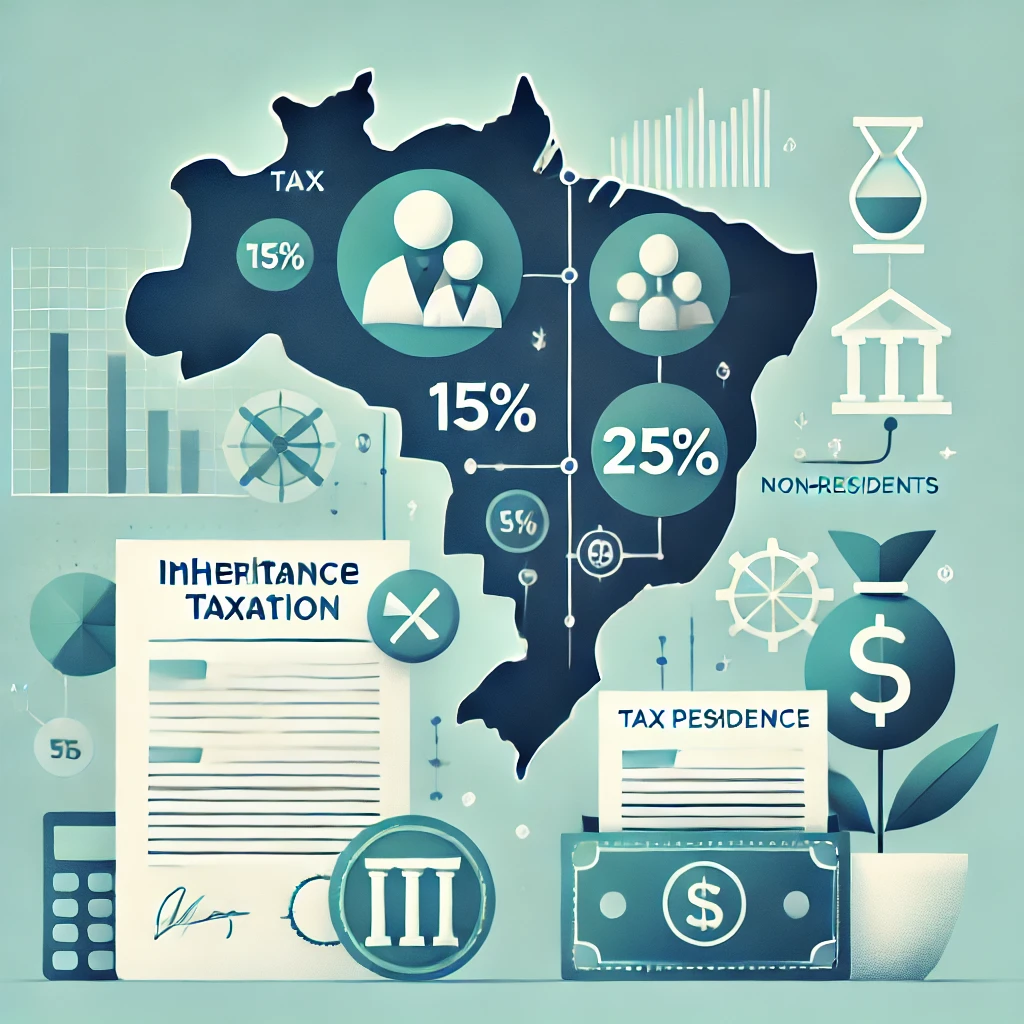Introduction:
In the complex scenario of international taxation, the issue of inheritance received by non-residents in Brazil has been the subject of important clarifications in recent years. COSIT Consultation Solutions No. 309/2018 and No. 41/2021 shed light on this issue, establishing clear guidelines on how the Brazilian Federal Revenue Service interprets and applies tax legislation in these cases.
As a specialist in international finance and a consultant with more than two decades of experience helping Brazilian investors and expatriates, today I’m going to unravel the nuances of these consultations and their practical implications for non-residents who receive inheritances in Brazil.
Recent data from the Central Bank of Brazil shows a 22% increase in the volume of international remittances related to inheritances over the last two years, totaling more than R$ 2 billion. This significant growth underscores the importance of correctly understanding the tax obligations associated with these inheritance transfers.
This comprehensive guide has been developed for Brazilian expats, international investors, lawyers and financial advisors dealing with succession issues involving Brazil. We’ll turn complex legal jargon into practical strategies, enabling you to navigate this challenging tax landscape with confidence.
Part 1: Ready to Roll 🚀 – Basic Strategies and Practical Actions
Part 1, “Ready to Roll”, offers practical actions and immediate advice for entrepreneurs who need quick and effective guidance.

1. Overview of Inheritance Taxation for Non-Residents
Before we dive into the specifics of the Consultation Solutions, it’s crucial to understand the bigger picture:
- Withholding Income Tax (IRRF): The main federal tax levied on inheritances received by non-residents.
- ITCMD (Imposto de Transmissão Causa Mortis e Doação): State tax that may be levied additionally.
- Differentiated rates: Vary according to the jurisdiction of the beneficiary.
2. Main points of COSIT Consultation Solution No. 309/2018
This consultation established the basis for current taxation:
- Incidence of IRRF: Confirmed that inheritances received by non-residents are subject to IRRF.
- Standard Rate: Established 15% as the general rate.
- Special Rate: 25% for beneficiaries in countries with favored taxation (“tax havens”).
- Legal basis: Article 682, item II, of the Income Tax Regulations (RIR/2018).
3. Advances brought about by COSIT Consultation Solution No. 41/2021
The 2021 consultation reaffirmed and expanded the previous understanding:
Alert on ITCMD: Mentioned the possible additional incidence of the state tax ITCMD.
Confirmation of Taxation: Reiterated the incidence of IRRF on inheritances to non-residents.
Classification of Income: Classified inheritances under the concept of “income paid, credited, delivered or remitted” abroad.
Calculation Basis: Clarified that the tax is levied on the total value of the inheritance, regardless of the origin of the assets.
Part 2: Deep Dive 🤿 – Technical Deepening in Advanced Strategies
Part 2, “Deep Dive”, provides in-depth analysis for those who wish to delve into the technical and complex aspects of international finance.

4. Detailed Analysis of the Legal Basis
4.1 Basis in the Income Tax Regulations
Article 682, item II, of the RIR/2018 is the cornerstone of this taxation. Let’s take a look at its application:
- Legal text: “Income from residents or domiciled abroad is subject to income tax at source, at the rate of fifteen percent: […] II – other unspecified income.”
- Revenue Interpretation: Inheritances are classified as “other income”, justifying taxation.
4.2 Concept of Income Applied to Inheritances
The expansion of the concept of income to include inheritances is controversial:
- Traditional View: Inheritances are generally not considered income, but a transfer of assets.
- Revenue position: Equates inheritances with income for non-resident tax purposes.
- Implications: This interpretation significantly broadens the scope of taxation on non-residents.
5. International succession planning strategies
Considering this tax scenario, some strategies can be considered:
- Prior Asset Structuring:
- Use of international holding companies
- Trusts in favorable jurisdictions
- Timing the Change of Tax Residence:
- Assessing the ideal time to leave Brazilian tax residency
- Jurisdictional Diversification of Assets:
- Distributing assets in different countries to optimize the global tax burden
- Living Gifts vs. Inheritance:
- Analyzing the tax advantages of lifetime transfers
- Use of International Treaties:
- Explore benefits of agreements to avoid double taxation
6. Challenges and Controversies
6.1 Possible double taxation
- IRRF vs. ITCMD: The simultaneous incidence of these taxes can lead to a high tax burden.
- Constitutional Challenge: Questions about the constitutionality of this double taxation.
6.2 Conflict with International Treaties
- Some double taxation treaties do not provide for the taxation of inheritances.
- Potential for legal disputes based on international agreements.
6.3 Tax Fairness Issues
- Non-residents may face a higher tax burden than residents in similar situations.
- Debate about the fairness of this tax differentiation.
7. Compliance and Practical Aspects
Responsibility for collection:
Generally falls to the executor or administrator of the estate in Brazil.
Documentation required:
Death certificate
Documents proving the status of heir
Valuation of assets to determine the tax base
Deadlines and procedures:
The IRRF must be paid by the last working day of the month following the payment or credit of the inheritance.
Use revenue code 5286 for payment.
Accessory declarations:
Obligation to report the transaction in the Withholding Income Tax Return (DIRF).
Conclusion
COSIT Consultation Solutions No. 309/2018 and No. 41/2021 brought significant clarity to the taxation of inheritances received by non-residents in Brazil, but also raised complex and potentially controversial issues. Equating inheritances with taxable income for non-residents represents an assertive position by the IRS, which could have far-reaching implications for international succession planning involving Brazilian assets.
For Brazilian expats and international investors with interests in Brazil, it is crucial to adopt a proactive and informed approach. Succession planning must now, more than ever, consider the tax implications both in Brazil and in the beneficiaries’ jurisdictions of residence.
As I always emphasize to my clients, there is no one-size-fits-all solution. The ideal strategy will depend on a careful analysis of the individual situation, taking into account the composition of the assets, the jurisdictions involved and the family’s long-term objectives.
It is important to remember that although these Consultation Solutions represent the current understanding of the Federal Revenue Service, the issue may still be the subject of legal discussions and possible future legislative changes. Therefore, keeping up to date and relying on expert advice is fundamental to navigating this evolving scenario.
To further deepen your knowledge and receive personalized guidance on how to structure your succession planning considering these new tax interpretations, I invite you to participate in our next webinar “Masterclass in International Succession Planning for Brazilians”. In it, we will discuss practical cases, advanced estate structuring strategies and the latest trends in international inheritance taxation.
FAQs
- Q: Does the 15% IRRF tax apply to all types of inheritance received by non-residents in Brazil? A: Yes, according to the Consultation Solutions, the 15% rate applies to all types of inheritance, regardless of the nature of the assets (real estate, shares, cash, etc.), except for beneficiaries in tax havens, where the rate is 25%.
- Q: How is the basis for calculating IRRF on inheritances determined? A: The calculation basis is the total value of the inheritance received by the non-resident, without deductions. This value must be determined in accordance with the rules for valuing assets for inventory purposes in Brazil.
- Q: Is there any way to avoid double taxation between IRRF and ITCMD? A: Currently, there is no official mechanism to avoid this double taxation. Some experts argue that this can be challenged in court, but there is still no consolidated case law on the subject.
- Q: How does taxation work for beneficiaries in countries with a double taxation agreement with Brazil? A: The Consultation Solutions do not specifically address this issue. In practice, the applicability of double taxation agreements in inheritance cases is a complex issue and can vary depending on the specific agreement. It is advisable to seek specialized advice for each case.
- Q: Is there any prospect of a change in this interpretation by the IRS in the near future? A: Although there are no immediate indications of a change in the IRS’s position, this is an issue that continues to generate debate in the legal and tax circles. Future changes may occur through new administrative interpretations, court decisions or even legislative changes.

Member of the IMA (Institute of Management Accountants) – USA
Member of the AICPA (American Institute of CPAs) – USA
Member of AAII (American Association of Individual Investors) – USA
Member of AAA (American Accounting Association) – USA
Member of the FMA (Financial Management Association) – USA
These associations not only attest to Kleyton’s commitment to professional excellence, but also ensure that his knowledge is always at the forefront of international financial and accounting practices.
With a robust academic background, including a Bachelor’s degree in Accounting and MBAs in International Finance and Accounting, as well as in International Business, Kleyton offers a unique and comprehensive perspective on the global business landscape.
Through the Tartarotti Report, Kleyton invites visionary entrepreneurs and executives to connect, explore opportunities for collaboration and, together, successfully navigate the complex world of international corporate finance.







